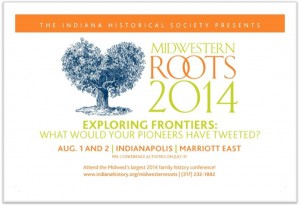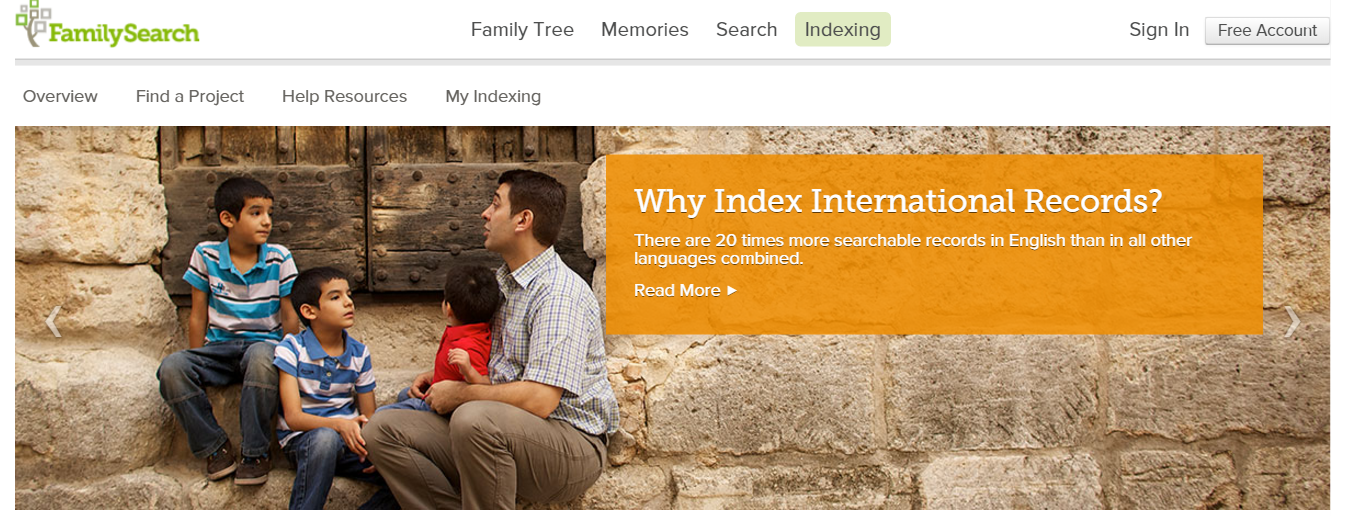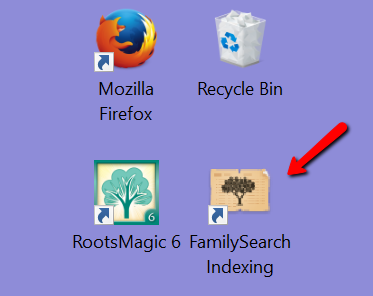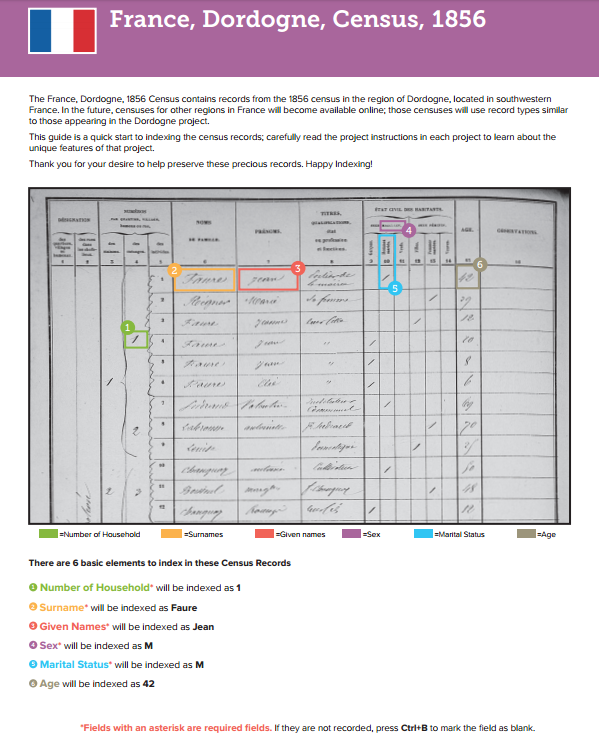by Lisa Cooke | Mar 26, 2014 | 01 What's New, Conferences
I have roots in Indiana and have longed to travel to Hoosier state to conduct some much needed genealogy research. So you can imagine how happy I  was to be invited to keynote at the upcoming Midwestern Roots 2014: Family History and Genealogy Conference being held August 1 and 2, 2014, Indianapolis, IN, at the Indianapolis Marriott East.
was to be invited to keynote at the upcoming Midwestern Roots 2014: Family History and Genealogy Conference being held August 1 and 2, 2014, Indianapolis, IN, at the Indianapolis Marriott East.
This year’s theme is a timely one: Exploring Frontiers: What Would Your Pioneers Have Tweeted? This conference promises to be a glorious melding of old and new with deep history sessions and the latest technology.
Here’s the scoop on the Midwestern Roots Conference:
Registration Opens March 26 with a $99 registration special price March 26-29, 2014.
Includes the two day conference and lunches.
Additional fee for banquet and some pre-conference activities.
Register online at www.indianahistory.org/midwesternroots or
call (317) 232-1882 from 10 a.m.-5 p.m. Thursday through Saturday during the special offer.
The Midwestern Roots 2014 Conference is your chance to get updated on the latest technology changes in family history research, resources and methodology, and I’ll be exploring that in my keynote Future Technology and Genealogy: 5 Strategies You Need. You’ll also experience:
• More than 30 stimulating lectures from nationally known speakers Warren Bittner, Lisa Louise Cooke, Joan Hostetler, Amy Johnson Crow, Thomas MacEntee, James H. Madison, Anne Gillespie Mitchell, Daniel S. Poffenberger, Curt B. Witcher and more
• The Great Google Earth Game Show presented by Lisa Louise Cooke (this will be an interactive, FUN, outside the box kind of session topped off with prizes!)
• Hoosiers and A New History for the Twenty-First Century presented by James H. Madison
• A Guided Tour of Ancestry computer lab taught by Amy Johnson Crow and Anne Gillespie Mitchell from Ancestry.com
• Genealogy Resources Library Workshop
• Writing, document preservation and photo preservation workshops
• Family History Market and Book Fair – open to the public
See you at the Midwestern Roots 2014 Conference!
by Lisa Cooke | Apr 28, 2018 | 01 What's New, Newspaper
Finding old newspapers from your ancestors’ hometown isn’t always easy. Here’s how to use Chronicling America to identify the newspapers that were in print at the time. Those issues may not be online, so Chronicling America also points you to copies of those...
by Lisa Cooke | Sep 12, 2016 | 01 What's New, FamilySearch, Volunteer
According to an article on the FamilySearch blog, 90% of all indexed records on FamilySearch are those for English-speaking countries. While this is super exciting for me and my family tree, many of my friends are unable to trace their family histories past their great-grandparents. Why? Because the records in their native country have been digitized, but not indexed.
FamilySearch Indexing in These Easy Steps
I have been indexing at FamilySearch for years and you can join me! Just follow these simple steps:
- Go to www.familysearch.org.
- Sign-in and click on Indexing and choose Overview from
 the pull-down menu.
the pull-down menu.
- Click on Get Started, which will direct you to the Get Started page. You will need to download the indexing program directly to your device.
- From your desktop, open the FamilySearch Indexing program by clicking on the icon.
- Sign-in again and click Download Batch at the top left corner.
- Choose a project to work on.
If you feel you need some further instruction, watch these helpful videos below:
FamilySearch Indexing: How to Start
FamilySearch Indexing Training: Video 1
FamilySearch Indexing in Another Language

Training for French Language
FamilySearch is looking for three kinds of people:
- Fluent, native speakers of non-English languages living in their native county or in an English-speaking country.
- People who have extensive training in a non-English language.
- English speakers who are willing to learn how to index specific types of non-English records.
I know what you are thinking…you hardly passed French 101 in high school! But, you can do it.
There was recently a very successful Italian indexing training initiative in the U.S. It more than doubled the worldwide number of individuals working on Italian records. You can be a part of the growing need for French, Spanish, Italian, and Portuguese record sets.
Training guides and videos have been created for the French, Spanish, Portuguese, and Italian languages. As we accomplish the work for these places, FamilySearch will add more languages. The videos and guides will help volunteers to learn how to index specific types of records. Click here to learn about this language learning initiative and to get started.
What Else Can You Do for FamilySearch Indexing?
If you have friends or family who are fluent in another language, ask them to join you. Share this post with your friends on Twitter and Facebook to get the word out. Does your teen need some service hours for graduation, Girl/Boy Scouts, or other organization? This is a unique service project that even teens can do and that will be meaningful to many.
We would love to hear your stories of successes in indexing. Leave a comment below or post to our Genealogy Gems Facebook page.
More Gems on Indexing
Volunteer Gem: He Indexed Milwaukee Journal Obituaries Himself!
Want to Help Index De-Classified CIA Records?
 was to be invited to keynote at the upcoming Midwestern Roots 2014: Family History and Genealogy Conference being held August 1 and 2, 2014, Indianapolis, IN, at the Indianapolis Marriott East.
was to be invited to keynote at the upcoming Midwestern Roots 2014: Family History and Genealogy Conference being held August 1 and 2, 2014, Indianapolis, IN, at the Indianapolis Marriott East.

 the pull-down menu.
the pull-down menu.
